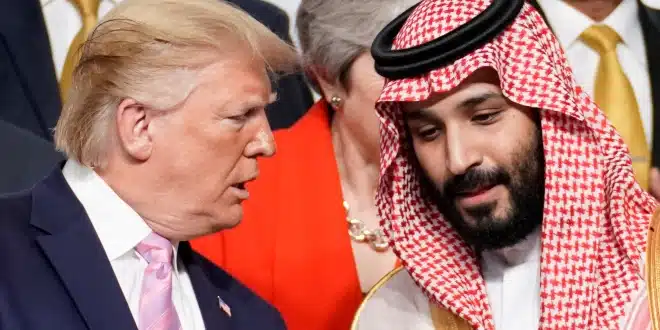Saudi Arabia is set to host a high-level summit on February 20, bringing together the leaders of four key Arab nations to discuss the controversial proposal put forward by U.S. President Donald Trump regarding the future of Gaza. The meeting will include the heads of state from Egypt, Jordan, Qatar, and the United Arab Emirates, with discussions expected to focus on Trump’s suggestion of a U.S.-controlled Gaza and the forced relocation of its Palestinian population.
A source familiar with the summit’s preparations indicated that Palestinian President Mahmoud Abbas is also slated to attend. The summit comes ahead of an Arab League gathering in Cairo, where regional leaders will further deliberate on the matter.
Trump’s proposal, which has drawn widespread condemnation, involves the United States assuming control over Gaza and relocating over two million Palestinians from the war-ravaged enclave. His suggestion cited Egypt and Jordan as potential resettlement destinations, an idea that has been met with fierce resistance across the Arab world.
The U.S. president unveiled this plan during Israeli Prime Minister Benjamin Netanyahu’s recent visit to Washington. However, the prospect of mass displacement has triggered strong reactions, with Arab nations uniting in opposition. For Palestinians, such a move evokes painful memories of the Nakba, the mass expulsion that accompanied Israel’s establishment in 1948.
In response to the backlash, Trump has reportedly hinted at cutting financial aid to Egypt and Jordan if they refuse to comply with his plan. Jordan, already home to over two million Palestinian refugees, faces growing pressure as half of its 11 million residents are of Palestinian descent.
Egypt, in contrast, has proposed an alternative plan centered on Gaza’s reconstruction while ensuring that Palestinians remain in their homeland. The Egyptian initiative underscores a broader regional consensus against forced displacement and seeks a sustainable resolution that safeguards Palestinian rights.
The Only Plan on the Table?
U.S. Secretary of State Marco Rubio emphasized on Thursday that Washington is open to considering alternative proposals from Arab governments regarding Gaza’s future. However, he acknowledged that, as of now, the Trump plan remains the only official proposal.
In January, former Secretary of State Antony Blinken outlined a roadmap for Gaza’s post-war governance, suggesting that any long-term solution must include a clear path toward Palestinian statehood—a condition that Israel vehemently opposes. Regional powers, including Saudi Arabia, have consistently advocated for the establishment of an independent Palestinian state coexisting with Israel.
U.S. Diplomatic Push and Global Engagement
Rubio departed on Friday for a diplomatic tour that includes stops in Europe and the Middle East. His itinerary features a crucial meeting at the Munich Security Conference, where he will join U.S. Vice President JD Vance in discussions with Ukrainian President Volodymyr Zelensky. The U.S. delegation’s European visit follows a surprise phone call between Trump and Russian President Vladimir Putin, during which Trump expressed his intent to broker peace negotiations to end the ongoing conflict in Ukraine.
After the Munich summit, Rubio is scheduled to visit Israel, Saudi Arabia, and the UAE to assess the fragile ceasefire in Gaza, which has been in effect since January 19. This truce remains tenuous, with both Israel and Hamas accusing each other of violations.
Following his call with Putin, Trump hinted that their first in-person meeting could take place in Saudi Arabia, further highlighting Riyadh’s growing influence on global diplomatic affairs.
Saudi Arabia’s Strategic Role
Saudi Arabia, which has recently positioned itself as a central player in Middle Eastern diplomacy, officially welcomed the opportunity to host the summit. However, it has yet to confirm whether the meeting will proceed as planned.
Analysts suggest that Saudi Arabia aims to reinforce its standing as a key mediator in the Israeli-Palestinian conflict. Riyadh also seeks to demonstrate solidarity with Egypt and Jordan, both of which are under increasing pressure due to Trump’s proposal. Some experts believe the kingdom could offer economic support to these nations in case the U.S. withdraws financial aid as a punitive measure.
Saudi political analyst Suleiman Aloqeliy noted that the upcoming summit will likely focus on crafting an Arab-led alternative to forced displacement while establishing clear guidelines for regional engagement on the issue.
With Qatar and Egypt already acting as mediators in the Gaza conflict, this summit could serve as a stepping stone toward forging a unified Arab stance. According to regional affairs expert Umar Karim, the gathering aims to consolidate support among Arab nations and present a collective front against forced displacement policies.


